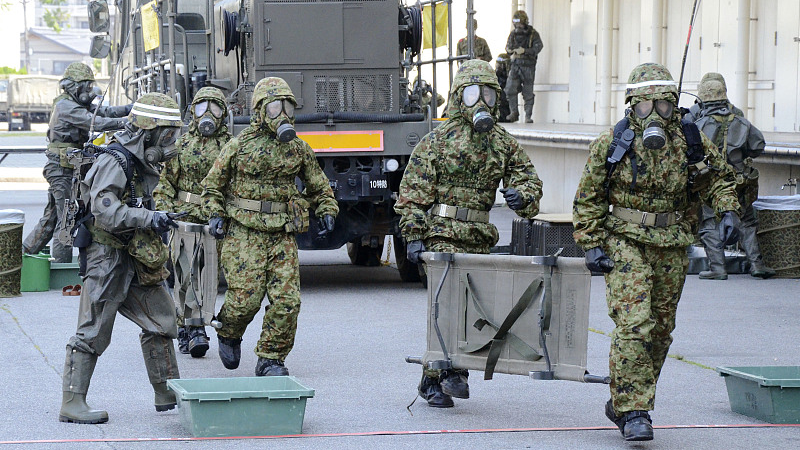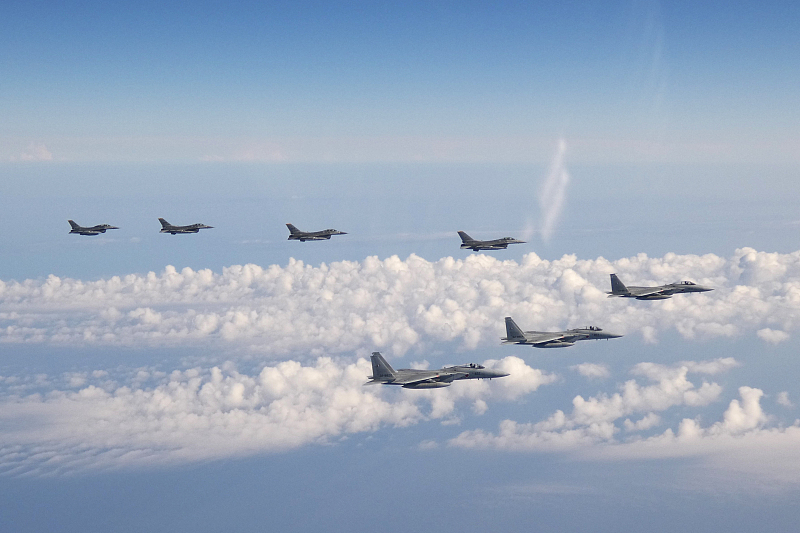
Japanese Ground Self-Defense Force personnel conduct a drill for a potential accident at a chemical plant at a garrison in the central Japan city of Nagoya, June 10, 2021. /CFP
Japanese Ground Self-Defense Force personnel conduct a drill for a potential accident at a chemical plant at a garrison in the central Japan city of Nagoya, June 10, 2021. /CFP
Editor's note: Yan Zeyang is an assistant researcher at the Institute of Northeast Asian Studies, China Institutes of Contemporary International Relations. The article reflects the author's opinions and not necessarily the views of CGTN.
On August 15, 1945, the Japanese government officially announced its unconditional surrender. This marked the victory of the anti-fascist war of the people all over the world. This year marks the 77th anniversary of Japan's defeat in the war, but Japan's recent behavior is incompatible with the introspection of that historic defeat.
Japan can't face history correctly
After World War II, the criminals who started the war in Japan were properly trialed and punished. However, war criminals including 14 Class A convicts are still enshrined in the Yasukuni Shrine in Tokyo, which attracts open visits from Japanese politicians from time to time. Right-wing politicians and some media in Japan have repeatedly glorified or even denied the crimes committed by Japan. Some Japanese right-wingers see Class A war criminals as "heroes" and emanating "spiritual strength."
In his speech on the 70th anniversary of the end of World War II, late former Prime Minister of Japan Shinzo Abe said, "We cannot let future generations who have nothing to do with the war take on the fate of continuing to apologize." In recent years, Japan has been moving faster and faster towards becoming a political power.
In the process of Japan's rush towards an "ordinary country," many key figures in the Japanese political circle have been unloading the historical burden and establishing its image as a political power by denying aggression and erasing its disgraceful history. This sets up a new obstacle to a correct understanding of historical issues.
For many Japanese right-wing politicians, if they want to get rid of the post-war system and relive the old dream of the empire, they have to hide and distort history. Lifting the ban on the right to collective self-defense and amending the "Peace Constitution" cannot bypass the threshold of history.
Japan's logic is that if the aggressive nature of war is denied and the historical facts that militarism killed people like hell is deleted, Japan can proudly claim to be a "normal country," and it can also confidently prepare its armed forces and send troops to fight overseas.
The German government is committed to remembering history and eradicating the legacy of the Nazis. Its sincere reflection on history has earned Germany people's understanding and respect. As a country that also committed heinous crimes in the war of aggression, Japan's ambiguous attitude towards historical issues is chilling. The world should be vigilant. If the Japanese right-wing forgets its history but inherits the legacy of militarism, it will become very dangerous.
Japan is accelerating military expansion
In 2022, Japan is entering its most arrogant military expansion period since World War II. In May of this year, the Defence Ministry of Japan submitted a request for an increase in the military budget for 2022, with a total of 5.48 trillion yen (about $50 billion) of defense spending, an increase of 2.6 percent compared with last year. This is the tenth consecutive year of increase in Japan's defense spending.

Three F-15 warplanes of the Japanese Self-Defense Force, front, and four F-16 fighters of the U.S. Armed Forces fly over the Sea of Japan, May 25, 2022. /CFP
Three F-15 warplanes of the Japanese Self-Defense Force, front, and four F-16 fighters of the U.S. Armed Forces fly over the Sea of Japan, May 25, 2022. /CFP
Restricted by the Peace Clause of Japan's constitution, Japan's defense spending has been kept at no more than 1 percent of GDP for decades. But this limit has now been breached. At a meeting held on July 27, 2022, the Japanese government decided not to set a "ceiling" for next year's defense budget in response to China's growing "military presence." This means that Japan will continue to significantly increase its military spending.
On July 22, the Japanese cabinet meeting adopted the 2022 Defense White Paper. The new version of the "White Paper" focuses on exaggerating security threats, greatly increasing the defense budget, and, for the first time, mentions the development of the so-called counterattack capability, which makes Japan's defense policy more proactive and offensive.
On the pretext that the "regional security situation is grim," Japan has hyped up threats from neighboring countries to develop its own military power, which shows that Japan puts the goal of military confrontation above peace with neighboring countries. Its emphasis on "defense of the southwestern islands" and "attack capability against enemy bases" is clearly aimed at China's Diaoyu Islands, DPRK and other surrounding areas, which is obviously intended to intensify regional security conflicts and is detrimental to regional peace and development.
If its defense forces are strengthened beyond the scope permitted by Article 9 of the Constitution, Japan will further stimulate the regional arms race, which will backfire and fall into a security dilemma that threatens the regional situation.
In this special timing of the 77th anniversary of the end of World War II, Japan needs to introspect on its history. Only by treating history correctly and insisting on peaceful development can Japan reshape its image in the eyes of people in Asia and the world, and realize its own aspirations.
(If you want to contribute and have specific expertise, please contact us at opinions@cgtn.com. Follow @thouse_opinions on Twitter to discover the latest commentaries in the CGTN Opinion Section.)

